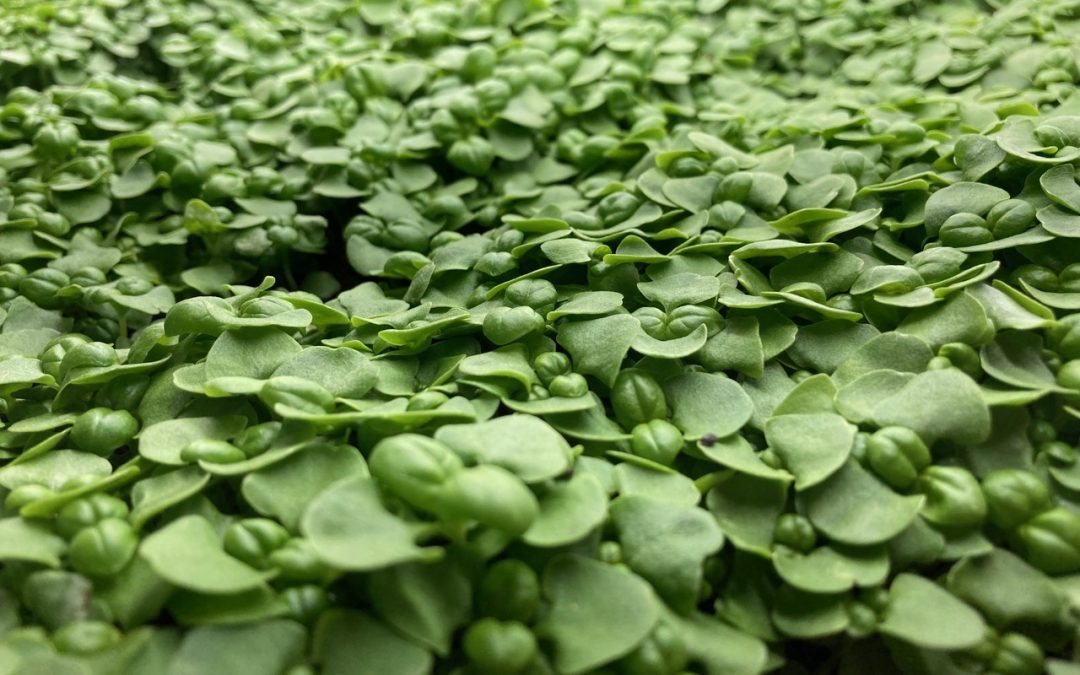I open the conversation by asking if the wilted arugula greens on our restaurant breakfast plates are from her employer and Mali looks at me in shock. No, she says, definitely not. And as if each leaf has a GPS tracking system on it, Mali is clear: these tiny greens aren’t hers. We both look down at the wilting arugula, and I nod in agreement.
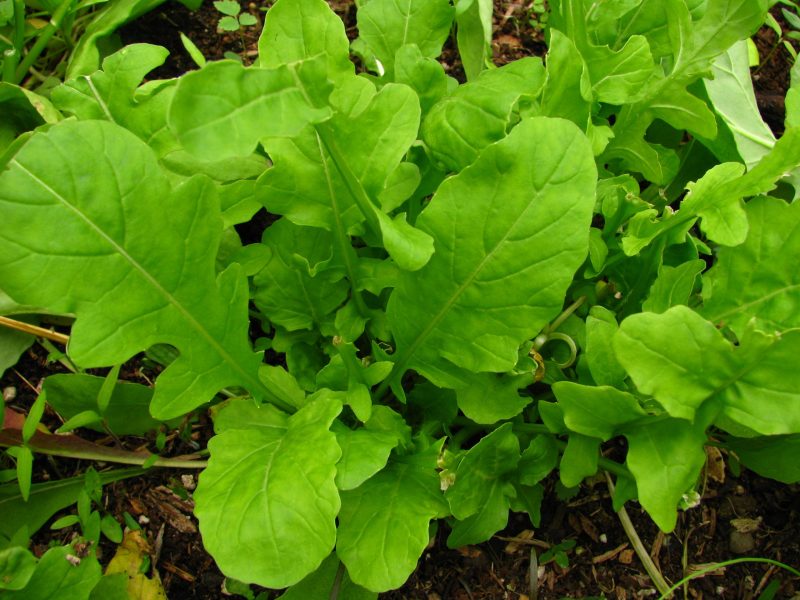
Arugula, also called Rocket, shown in my garden outdoors in summer is an excellent green to grow outdoors for using in salads and as pizza toppings, but it is also a micro-green worth growing indoors in the winter. Donna Balzer photo
Of course I didn’t even really need to ask the question because I know the quality of Micro YYC greens, and I know they are so fresh that even after two weeks in my fridge they are better than the ones on my plate right now.
A group of us are gathered for breakfast over the holidays. Mali is my granddaughter, and her gap year is stretching now to allow her time to work and earn a living. I am curious how this third generation gardener is liking her job growing micro-greens. Together with her friend Mathew (also a recent high school graduate) she is growing food even though it is December and we live in a cold climate.
I want to hear all about how Mali, together with a small crew and Operations Manager of Micro YYC, Brad Stanton, grow fresh food for Calgarians every day, even during the holidays. They grow for the people who eat at local restaurants, buy from farmers markets or support local shops. And suddenly, Mali and her friend Mathew surprise me by revealing the toughest part of growing greens for mass consumption.
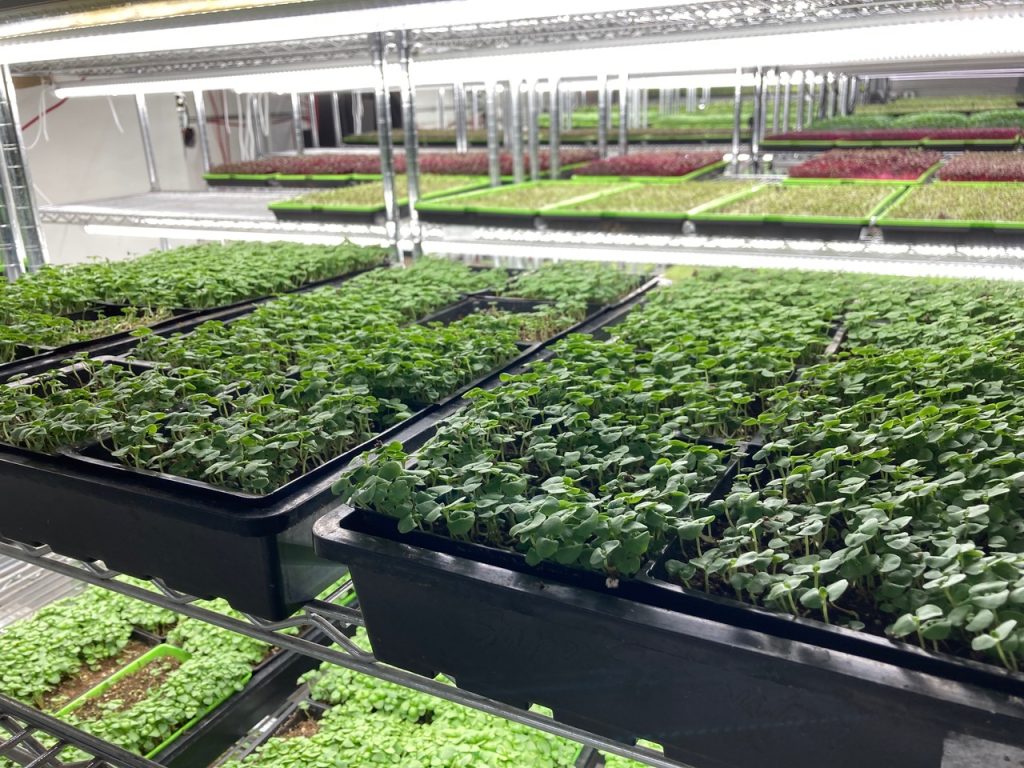
A peak inside Micro YYC just before Christmas, 2023. Greens are at all stages of growth and present a rainbow of tasty greens, reds and bicolored leaves. Donna Balzer photo
Its the hardest thing about growing micro-greens, says Mali, as Mathew concurs. As a greens grower for over a year, Mali has seen a lot of greens and a lot of new staff trying to grow greens. Most new staff are confused by this one step, and newbies find it the toughest part of growing.
What is this most difficult, hard to learn task when growing micro-green vegetables?
Watering, Mali and Mathew say together.
Most people can’t do it. They either overwater or underwater and the plants drown or wilt. But you can bring them back if they wilt, Mathew adds quickly. Gardeners trying to grow their own vegetables this winter might need to hear this because weather is not the biggest problem facing fresh-food growers in December, in Alberta. It’s watering.
And, by the way, Micro YYC is not off work for the holidays. They are busy growing food for their clients and soon to be clients. Yes, some of the restaurants and retail shops are shut down during the holiday break, but that only adds to the complexity of the work, because once everyone is back in the NewYear, taking up new routines like “healthy eating”, the greens need to be ready to sell. So the job for Mali and Mathew, their co-workers and their manager Brad, is all about planning the schedule and starting seeds in December so the greens will be ready to sell in early 2024.
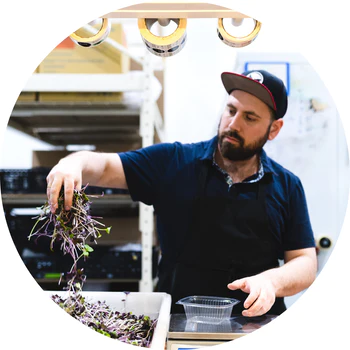
Brad Stanton, Operations manager, musician, chef. Photo Courtesy Micro YYC
This post is all about answering the tricky questions posed by gardeners wanting to grow this unique, yet slyly difficult, crop called micro-greens. Looking for tips and sources for growing your own greens? The family business in Saskatchewan called Mumm’s Sprouting Seeds sells only organic seeds and I use them exclusively as does Micro YYC because (they are) absolute the best supplier in Canada. Their website also includes amazing tips for growing greens at home and they don’t discriminate: Mumm’s sells to home gardeners, wholesale growers and garden centres for resale.
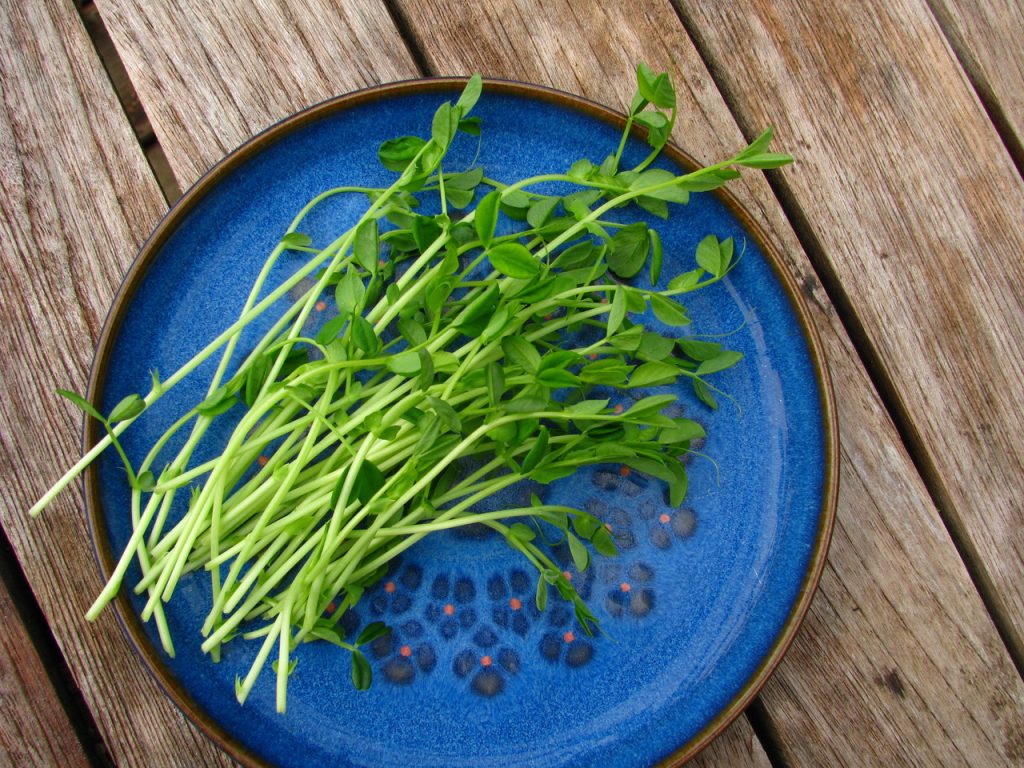
Pea shoots can be grown from any variety of peas and I love them served as a mini-salad year round. Commercially grown pea shoots are clipped well back to sell but if grown at home, consider cutting back to the lower leaf and letting them resprout. I had a client who harvested fresh greens for two months this way. Donna Balzer photo
And while Micro YYC is a large volume, wholesale operation, and Mali and Mathew can’t be at your house to water for you, home growers can jump on the band wagon now and grow their own fresh, nutricious bright green micro-greens this year. And because it takes a week or more to grow your own greens, you can buy them fully grown in the meantime from quality growers like Micro YYC in Calgary.
Brad Stanton, tells me the easiest and quickest micro to grow is brassica (such as broccoli), radish, or pea. It will be ready to eat in 10-14 days. They’re all pretty fool proof, and any beginner should start with these, Stanton tells me by email. At the same time, he mentions the slowest micro-greens to grow are the herbs, like cilantro, basil and parsley.
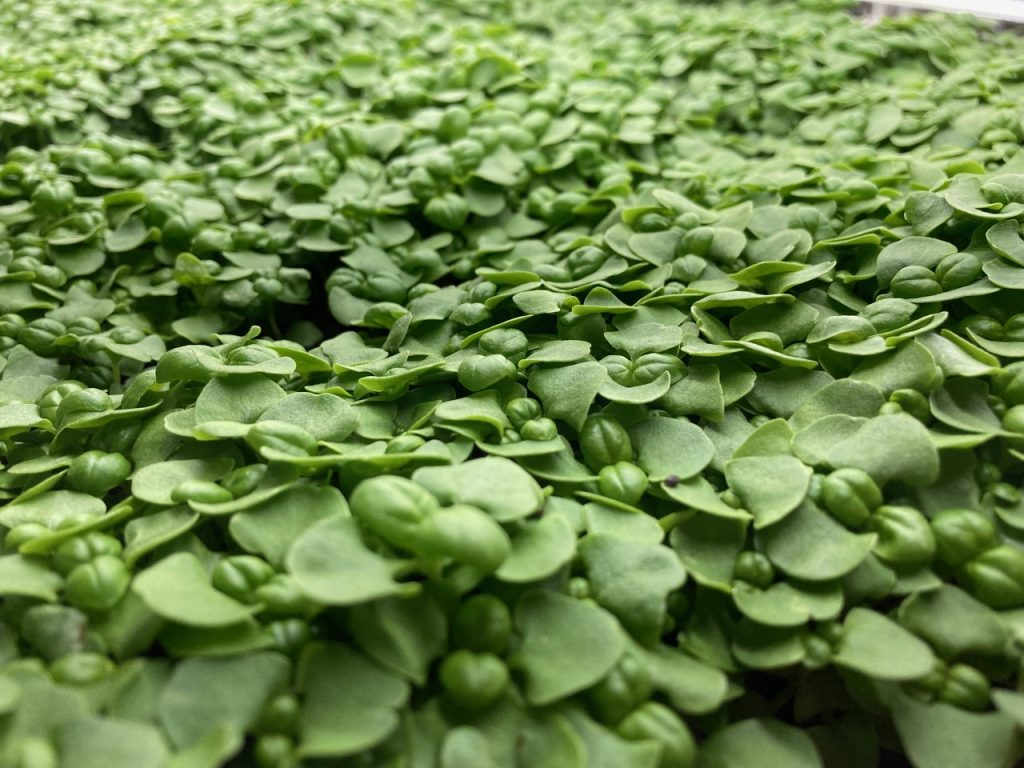
Basil is one of the slowest growing micro-greens according to Operations Manager, Brad Stanton of Micro YYC in Calgary, but it is an adorable little plant and like all micro-greens, the small seedlings taste exactly like the big plant so micros are a great way to add flavour without volume to any pizza, salad or breakfast dish. Donna Balzer photo
Trickier plants like Red-veined sorrel took Stanton 6 months of testing to figure out. But now that it works in our system we sell a lot of it to nice restaurants! Micro cilantro is also a tricky one so Stanton suggests buying it rather than growing it yourself. Fair enough. (To taste these without the grief of growing them, I suggest looking for them at shops like the Calgary Farmers Market or nicer restaurants.)
My podcast and writing partner Steven Biggs always surprises me by growing micro-greens in shallow trays and containers instead of proper planting trays and Stanton agrees with him completely saying You can grow in any clean, shallow plastic container, like an empty sour cream container. Maybe I am being silly but I love the consistency of a proper plant tray. Eight little containers per tray means eight kinds of micro-greens in one 11″ x 17″ tray. Very convenient and clean in my home grow-light system.
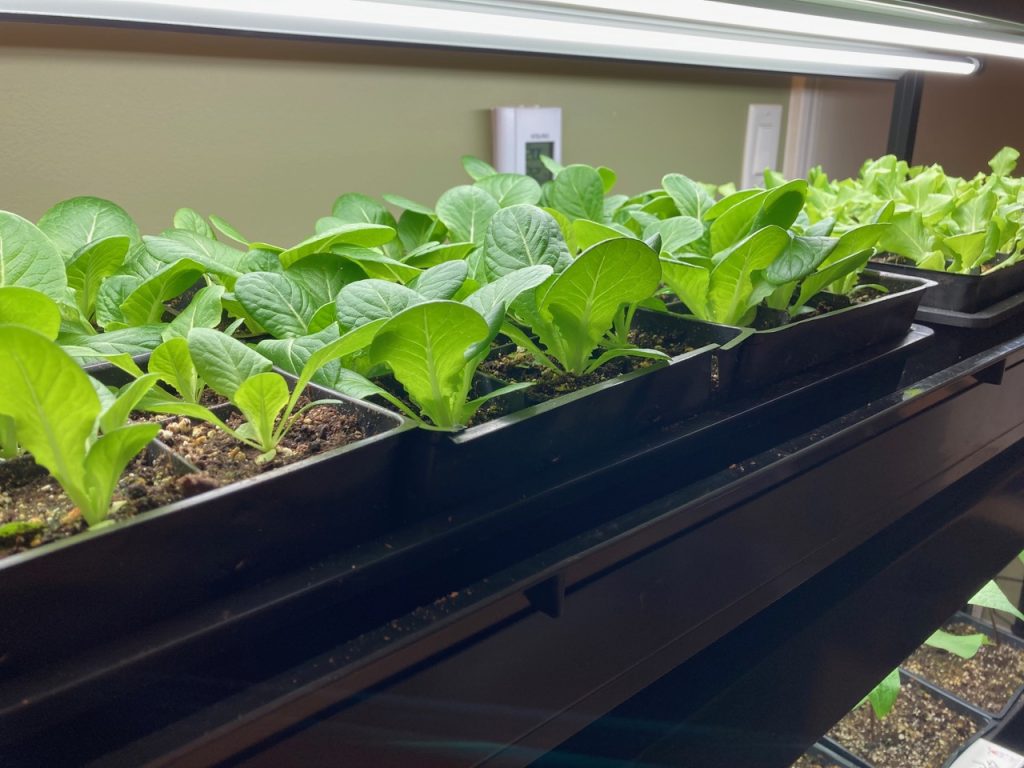
A home system of grow lights allows you to grow micro-greens or larger plants such as this lettuce for putting out into your greenhouse or directly on your salad plate. Donna Balzer photo
Getting back to the problem posed initially by Mali and Mathew, I ask Stanton about watering and why it is so difficult? Watering the right amount – not too much so the greens are wet, not too little so the soil dries out overnight (is the key.) It sounds simple, and it is when you’re growing just a little for yourself. But when you scale to hundreds of flats per week, things become a little more complicated.
As I start up my personal grow-op for the New Year, I admit I am one of those growers who should have started over the holidays, but with company and grandkids and parties to attend I ran out of time. So I am just getting out my seeds and washing my flats. I always buy new soil (PromixHP) and I reuse and wash flats with soapy water. With my system, trays are fast draining and I do not bring pests or disease into my new plants from anything previously grown.
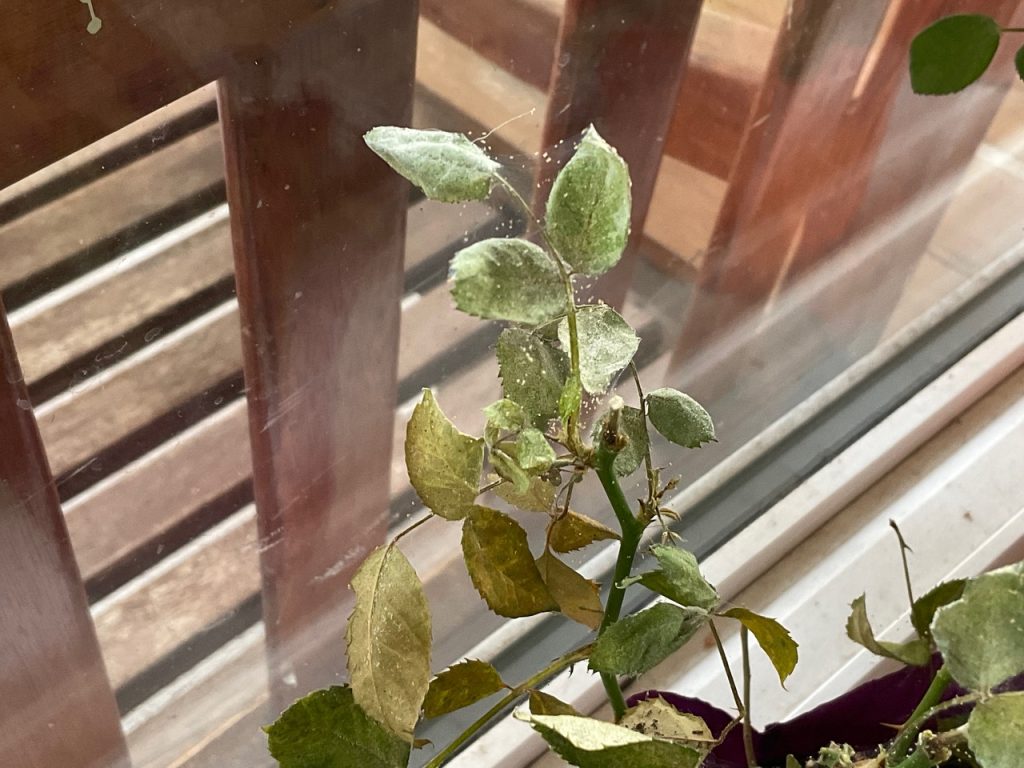
While visiting with my Son’s family I saw an extreme infestation of spider mites on a rose plant they had on their window sill. These small mites tend to be active in dry homes where extra lights keep them alive and active year round. I threw this rose away because it was so far gone but when growing greens I suggest moving your grow-op to a clean area away from other plants because even a wooly sweater or hairy dog moving past an infested plant like this can give mites a place to hitch a ride to your new crop of greens. Donna Balzer photo
With a timer on my grow lights, a heating pad under my flats and some attention to the little detail of water, I will be in business growing greens this week. Even with the heavy frost and frigid outdoor temperatures, growing micro-greens is possible in any climate and virtually any space from a small shelf to a large conservatory. My go-to green is pea shoots because they are so versatile and make the fixings for a salad all on their own. Also, they are ready in about a week because, like Stanton, I soak them overnight before seeding to get the really big pea seeds fully saturated before seeding.
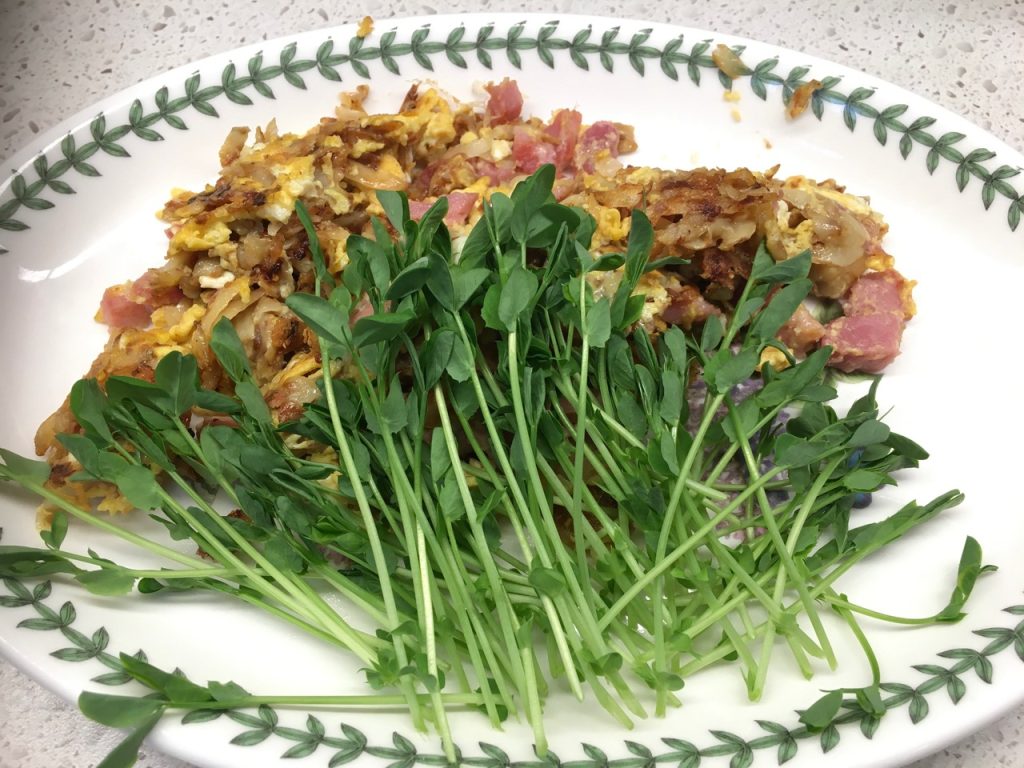
I eat the pea shoots I grow for breakfast with eggs and potatoes just because I can. If you want to grow your own healthy food in a very tiny space start right now. Donna Balzer photo.
And while Stanton didn’t mention it, I rarely grow sunflower micro-greens. I personally find them a bit tricky for me to grow and why push myself with a task this difficult so early in the New Year?
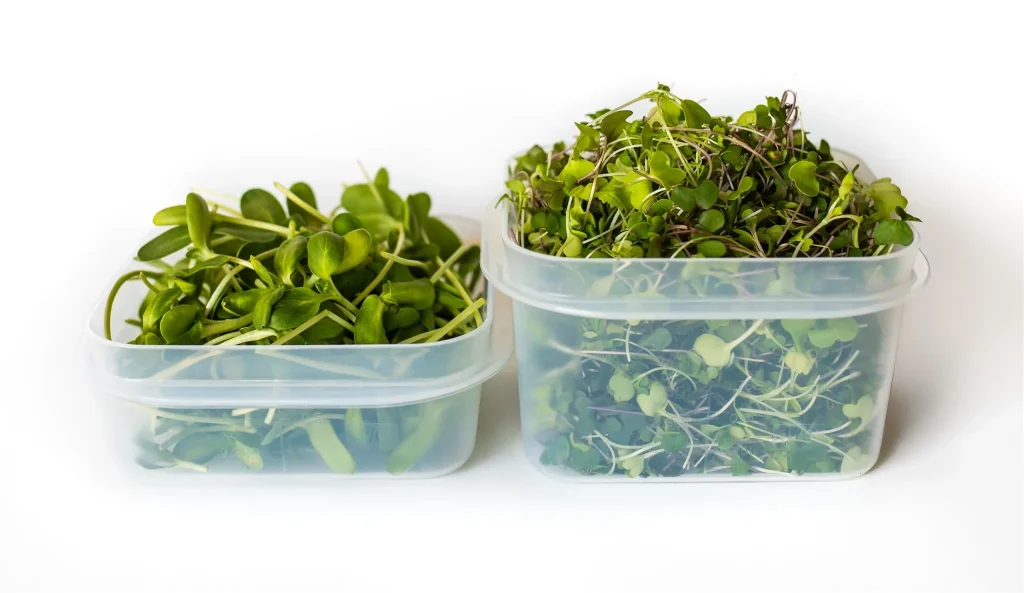
Micro YYC sells subscriptions to micro-greens delivered in reusable containers! Such a great way to meet your food-focussed resolutions in 2024 even if you don’t start growing your own. Photo Courtesy Micro YYC
PS If you want to find out how you can get greens delivered check out this LINK.
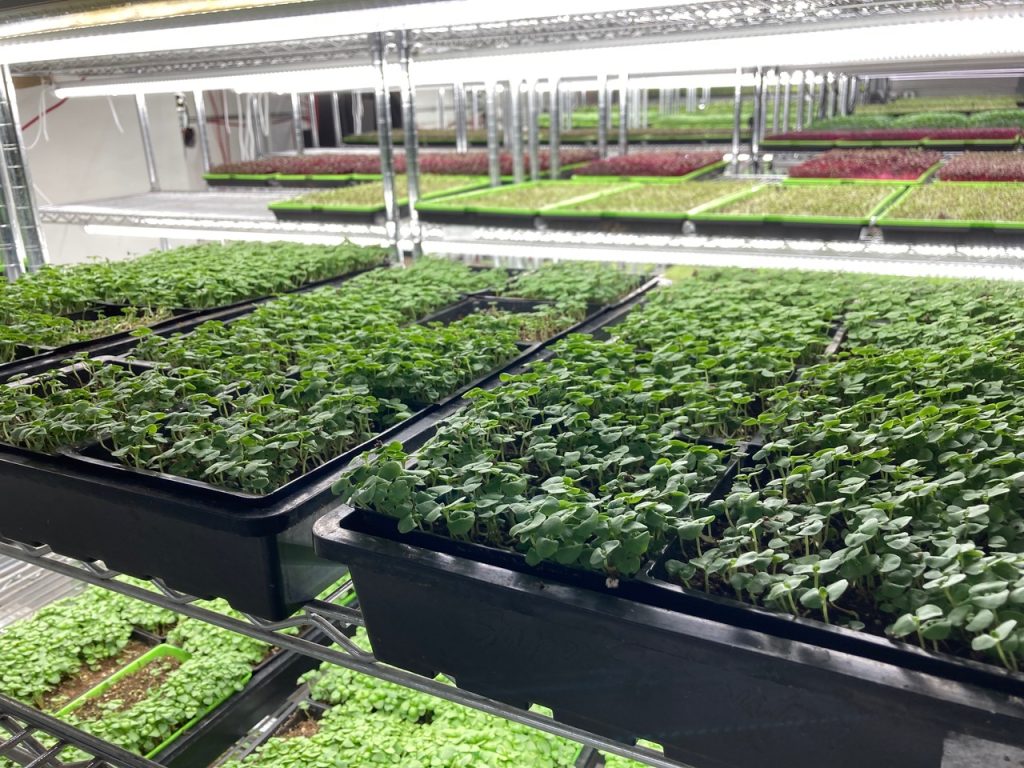
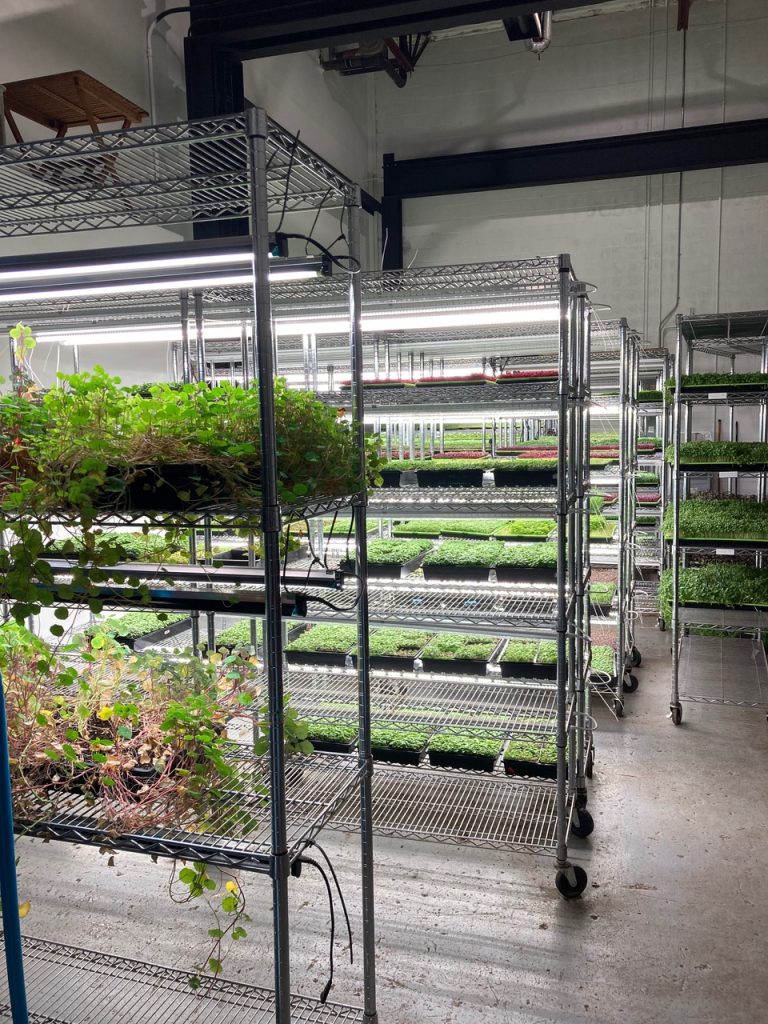
More photos from Micro YYC. Donna Balzer photo
